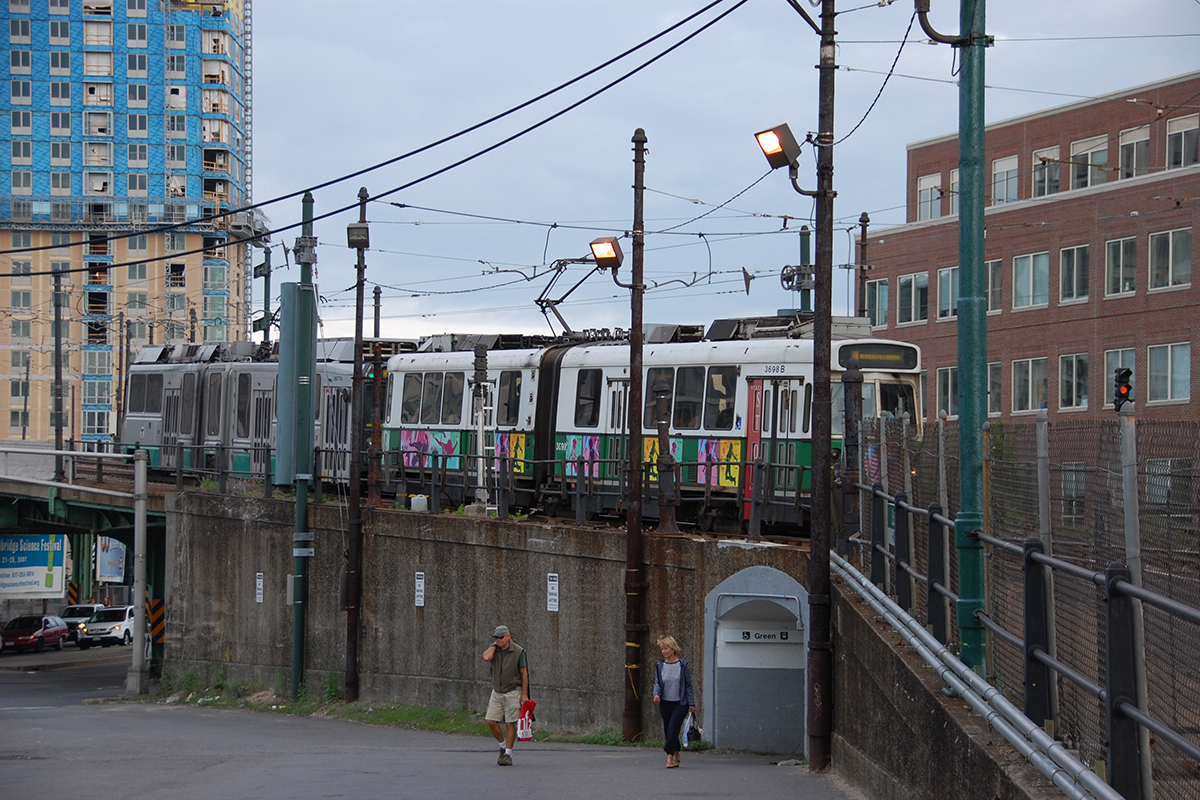Just Build the Damn Green Line Expansion

Green Line Trolley Approaching Lechmere Station by Eric Kilby via Flickr Creative Commons
The revelation this week that the Green Line extension is possibly headed for a $1 billion cost overrun has all kinds of transportation advocates crying foul.
Former Secretary of Transportation James Aloisi blasted the cost overruns in Commonwealth Magazine as damaging to public transportation advocates, a black mark on all who have managed the project, and yet another blow to the embattled Massachusetts Bay Transportation Authority.
“It’s as if they have been living in a hermetically sealed chamber, impervious to common sense and oblivious to the public debate about transportation funding priorities that has taken place in Massachusetts since 2009. It’s as if they weren’t around during the winter meltdown, when public confidence in the T sank to historic lows. If ever there was a time to demonstrate that we can expand our transit system in a fiscally responsible and intelligent way, it was now,” Aloisi says.
In a long online essay, Aloisi charged that the massive overrun feeds into the idea that the MBTA is a poorly run organization that spends money like a drunken sailor in old Scollay Square. The MBTA can—no, it must—expand while maintaining its current system, he argues.
“If we don’t keep pace with the times, we will simply fall further behind and never get out of the cycle of a chronically underinvested, unreliable, over-capacity system. Our mobility future depends on our ability to invest in fixing what we have, and also building strategic, targeted expansions of the system. Both are required. Both must be done,” Aloisi says.
He’s right, this project has to reach completion not only because we have a history of neglecting our public transportation infrastructure like spoiled brats that don’t realize how good we have it, but because of the changing nature of commuters in Greater Boston. As time marches on, the number of people living in the Greater Boston area without a car is only going to increase—it would be irresponsible to not make their needs the focus of current and future transportation projects. Enough kicking of the can on major public transportation projects that have been hashed out for years.
Developers have finally moved away from shortsighted car-centric designs in the city, leading to an increase in housing units that simply do not provide parking for everyone in the building or at all. This setup is not going to change as Boston is home to the third highest percentage of households without cars in the country. The 2010 census showed that 33 percent of trips made it in Boston are made via public transportation while another 17 percent walked or biked to work. Deeper dives show more than half of Greater Boston does not drive to work or school on a daily basis. (Full disclosure: the author owns a car and and property near the proposed extension but uses the T for pretty much everything.)
One of the great local public transportation blunders of our time is the stunted expansion of the Red Line in 1970s by knuckle-dragging idiots in Arlington. With the release of today’s report on how awful traffic is in Boston, how much do you bet their kids wish they had easy access to the Red Line now? Thanks Mom and Dad!
Over on Morrissey Boulevard, the Boston Globe editorial board said it’s not a question of whether the project happens, but of how it is funded.
“Canceling the extension would mean giving up almost $1 billion in funds from the federal government, missing the chance to borrow at historically low-interest rates, and abandoning a project that’s crucial for the economic development of a part of Greater Boston that’s been chronically underserved by public transit,” the Globe writes.
The problem for the MBTA, though, is that this project is already underway with some $300 million in contracts already committed to construction. Current Secretary of Transportation Stephanie Pollack said Monday that these sunk costs are significant to the agency. To turn back now would not only violate the state’s legally required commitment to the project, but squander hundreds of millions in already completed work.
Meanwhile, longtime Somerville Congressman Mike Capuano said there is no chance the Green Line Extension is dead. None. Zero.
If something awful does happen with the project, the state can kiss its $1 billion in federal funding for the project goodbye. Capuano told WGBH any future funding for the project will go to the back of the line if they pull the plug.
Scaling back parts of the project by reducing the lavishness of stations or simplifying portions of the root is needed, but so is developing unique funding schemes for the project. Devising a systemwide plan along the lines of the Hudson Yard’s project in New York, as the Globe suggests, may be difficult though, as there are a number of stakeholders involved with this project, unlike in Manhattan. Somerville Mayor Joe Curtatone said he would like to implement financing plans similar to what was devised in Assembly Square in the areas around each station.
The Green Line extension need not be gold-plated, but it needs to happen.


